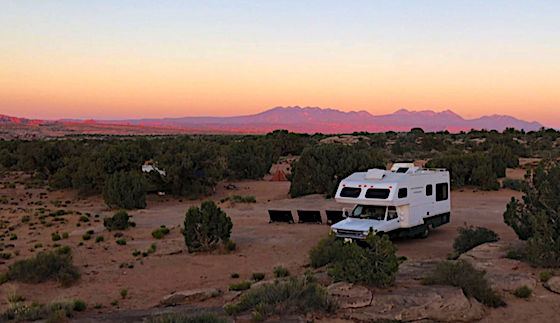Thanks for your support! If you make a purchase using our links in this article, we may make a commission. And, as an Amazon Associate, I earn from qualifying purchases. See the full disclosure here.
Are you looking for the Best Places to go RV Camping for Free?
Well read on to learn about the many options available to RVers looking to camp for free!
With the right planning and preparation, you can cut campground fees from your life. It’s easy to find free RV camping for your road trips. You can also find free long term campsites throughout the United States. All it takes is a little bit of research and networking.
Free RV Camping vs Free RV Parking
The first thing to understand is that free RV camping is not the same thing as free RV parking. Free RV Parking locations are places where you generally stay one night for free and you can’t really set up and camp. You just park, get some shuteye and leave in the morning.
Free RV Camping, on the other hand, entails staying multiple days in an RV at a specific location. You will find most of these free sites on public land. There are also some free RV camping sites on private property.
For instance, timber companies will often allow camping on land they own. However, the majority of the free RV camping sites will be found on public land.
We cover the best free RV camping places in this article along with some suggestions for free overnight RV parking too.
The Best Places to Go RV Camping for FREE are:
- BLM Locations
- National Forests
- National Parks
Free RV Camping at BLM Locations
Within the United States, you can often find free RV camping sites in Bureau of Land Management (BLM) areas. You will also discover free RV camping opportunities in Wildlife Management Areas (WMA), state forests, and grasslands.
It is essential to check with the proper authorities when taking advantage of free RV camping opportunities and to obey any rules or regulations. You may find certain high-use areas or wildlife habitats marked with “no camping” signs.
Other fragile environments may have specific rules to minimize damage. These rules could entail things like avoiding the living biological crusts found in specific desert environments or damage to vulnerable plants found in higher alpine areas.
However, a great deal of public land is available for responsible use. Obeying these rules and restrictions will help guarantee that they remain so into the future.
Free RV Camping in National Forests
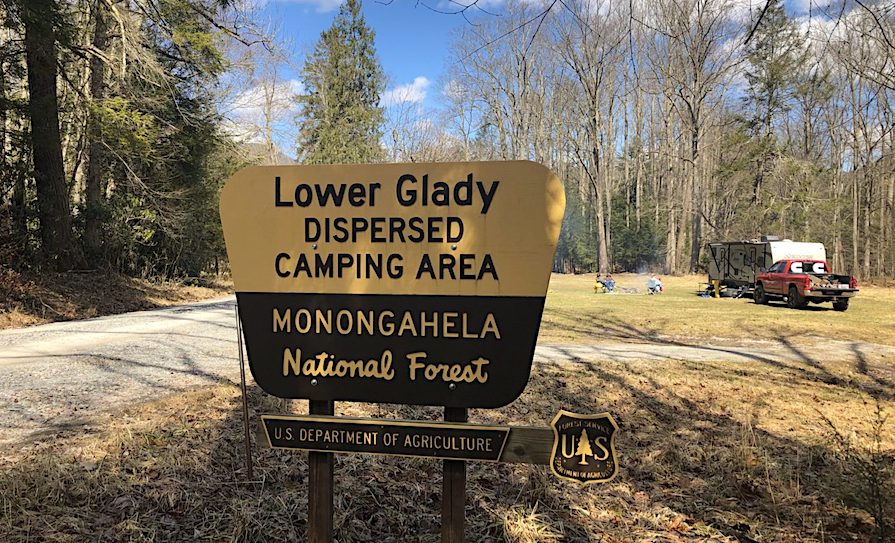
Free camping in national forests can save you a great deal of money. Often called “dispersed camping,” these sites offer a quieter, more rustic camping experience. However dispersed camping usually means no provided amenities such as restrooms, shower facilities, hookups, or fire pits. It will be just you and your RV.
Dispersed camping is legal camping in undeveloped campsites that are often located on forest access roads. To find info on every national forest in the US just click here!
Dispersed camping does require a bit more effort than pulling up to an established campground, and it may not be for everyone. Forest access roads aren’t always easy to find, and you’ll have to be willing to search for that perfect spot. However, for those RVers who enjoy more solitude and the pristine wilderness of our national forests, it can be an enriching experience.
Dispersed camping in national forests is not just a great way to save money. It is also a way to protect the more popular campsites from overcrowding. It is essential that, when using these undeveloped campsites, you practice the “Leave No Trace Behind” principles and leave your site as you found it. Following this practice will help guarantee that continued used of sites like these will continue.
If you’re interested in exploring a more primitive form of camping, this is a fantastic opportunity. You may find that dispersed camping in our national forests becomes your preferred way to see the country.
Free RV Camping in National Parks
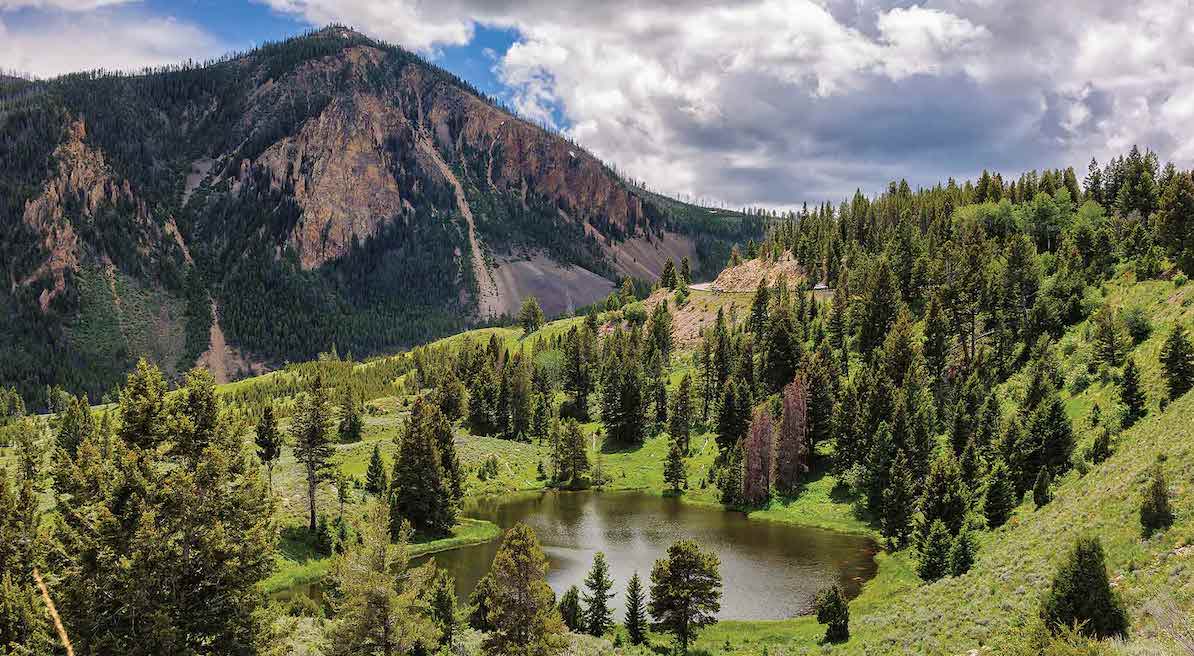
National Parks are a different animal altogether. There are 59 areas that have an official designation as a “national park.” Managed by the National Park Service, these are historical and protected areas in the United States and include things like national monuments, seashores, and other places of historical interest. For a free list of US National Parks just click here!
National Parks can be vast, such as the Grand Canyon or Yosemite National Parks. They can sometimes be as small as a single building such as the Thaddeus Kosciuszko National Memorial in Pennsylvania. Many areas designated as National Parks do not offer camping, and of the few that do, few provide campsites suitable for RVs.
However, all is not lost. There are a few National Parks that allow overnight RV parking, but generally camping is restricted to established campgrounds.
As an alternative, there are areas located just outside a National Park’s boundaries that offer free RV camping. And sometimes they even have a great view of the National Park.
Three examples are:
- The “Wall” is a rugged escarpment, or steep slope, bordering and overlooking Badlands National Park in South Dakota. Dispersed camping is allowed along the top of the wall, just outside the park boundary. The view of the park is spectacular.
- “Spread Creek Meadow” offers dispersed camping with a great view of the Grand Teton National Park in Wyoming. You can splash around in Spread Creek to cool off. Access can be hard bot doable for larger RVs. Watch out for mosquito season!
- Carbella Recreation Site in Montana offers dispersed camping just north of Yellowstone National Park with a terrific view of the Yellowstone River and the mountains.
Are There Free RV Camping Locations that Provide Hookups?
Most free RV camping sites and overnight parking spots do not have utility hookups. You must be prepared to dry camp if you want to save money. Dry camping is often referred to as boondocking.
This means that you have your own source of water and electricity. Most people who dry camp at free campsites have a large water tank installed in their RV. Generators and solar panels supply electricity when you are off the grid. You may want a satellite internet connection if you camp in very remote locations.
There are some free camping facilities with hookups available around the country. A few might require a small donation. Most of them provide water fill and dump stations. Some also offer water and electricity on the site. There are a few that even have full hookups.
Waylon Jennings Park in Littlefield, Texas, is an example. To thank them for supporting him early in his singing career, Waylon Jennings donated this campground to his home town. The thought was that having a campground would help bring revenue to the small community. Parks like this, either publicly or privately owned, can offer free campsites because small towns or businesses subsidize them.
For less adventurous RVers, campgrounds like those mentioned here with free or low-cost sites might be safer than dispersed camping or parking off the beaten track where there is no security.
Best Resources for Finding Free RV Camping
So, how do you find these free RV campsites? Finding free RV camping locations does become more comfortable over time. It can take a while to understand how to find them. However, there are several ways to get off to a great start.
The very best way we found to find free RV Camping locations is through our membership with The Dyrt. Our DyrtPRO membership just costs $36 a year and we have access to BLM and Forest Service boondocking locations. And best of all it has downloadable maps so when we lose our cell signal we can still get where we are going.
We like TheDyrtPRO so much we actually contacted the owners of The Dyrt and worked out a deal so our readers can get a 30 Day FREE Trial!!! So don’t take our word for it…try it yourself for free for 90 days. Susan and I are sure you will love it as much as we do.
All you need to do is go to TheDyrt.com and use discount code RVBlogger. Or just click the orange button below!
Another one of the best ways to find free RV parking spots is to ask the local police or sheriff’s office. Drop-in or give them a call. You might be amazed at the terrific camping spots they will direct you to, especially when dealing with smaller communities.
Maps are also an essential tool for finding good free RV camping sites. Another option is clear and concise directions from another RVer (You will still want the map). A great map choice for finding free RV camping locations in the west is Benchmark Maps. For all other states, National Geographic Recreation Atlas and the DeLorme Atlas & Gazetteer are highly-recommended.
Electronic navigation has dramatically improved, and GPS systems with added topographical mapping will get you just about anywhere. This equipment is perfect for adventuresome RV explorers.
Also, the USA RV Camping Map provides links to information on each state’s public land resources, as well as many free RV camping locations. Public land does offer the best free RV camping locations. But you will have to do your homework to find the best places, especially if you are heading into an unfamiliar area.
How To Find Long Term Free RV Camping Opportunities
Go West, Young Man!
Finding free long term camping opportunities east of the Mississippi can be challenging. Most land in this area is privately owned. The state and federally managed lands are much smaller than their western counterparts. They see more traffic and are heavily regulated.
If you are the type who loves the remote backcountry, go West. Alaska, Wyoming, Colorado, Arizona, New Mexico, and California have abundant remote camping opportunities. You will need to be skilled with a map and GPS, but you will be rewarded with amazing secluded campsites.
You will have to be more creative in your search for free RV camping sites if you want to stay on the East Coast. Long term opportunities can still be found through work exchanges.
Free RV Camping On Government Land
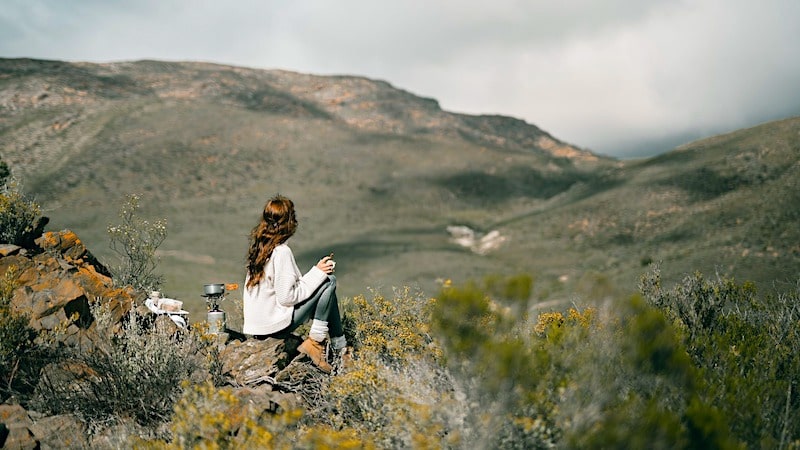
The United States Forest Service allows free dispersed camping for 14 consecutive days. The BLM also offers free dispersed camping, but their lands can be harder to navigate than the USFS. I recommend that you start your adventure in a National Forest.
Dispersed camping requires no reservations or notification. You simply show up and camp almost anywhere within the boundaries of the public land. Many of the remote access roads have pull off spots that are perfect for parking a small RV.
You must follow Leave No Trace camping principles. You will have to take in everything you need and pack out everything when you leave. You should make as little impact on the natural environment as possible.
You will be allowed to make fires as long as there is not a fire ban in place. You should always check with the local office to find out the current fire restrictions. You may only burn dead wood, you cannot cut down any live wood to use for fires. Make sure that you know how to safely start, supervise, and put out fires.
There are no amenities or supervision available, this is true wilderness camping. Make sure you are prepared before embarking on this adventure. It is important to have a first aid kit and an emergency plan. Get started by reading this guide on dispersed camping.
Once you are ready for this style of camping, you need to identify the area that you will be staying. For the US Forest Service, you can use this map to locate a National Forest or Grassland. When you’ve identified a forest or grassland you want to camp in, pull up the information page for that property.
As an example, this is the info page for the Apache-Sitgreaves National Forests in Arizona. On the left-hand side of the page, you will find the contact information for the Supervisor’s Office. Give them a call and tell them that you are looking for detailed maps of the area. Also, ask for information about any fire restrictions. The rangers can give you recommendations for good spots to park an RV for dispersed camping.
Make sure that you have a printed map and a well-stocked RV before heading to the spot you have chosen to camp. Some areas will not have cell service, so you may not be able to call for help. Forest access roads are not included in most GPS programs.
The USFS produces maps of its internal access roads for each property that they manage. These are called Motor Vehicle Use Maps. You can find them online, or request a printed version at the local office when you arrive.
It is a good idea to arrive in the morning and check-in at the Forest Service office before finding a camp spot. The rangers are very helpful and can give you valuable information. As you become more experienced you may skip this step sometimes. Stopping by the office is always recommended for newbies.
Work Exchange Opportunities for Free RV Camping
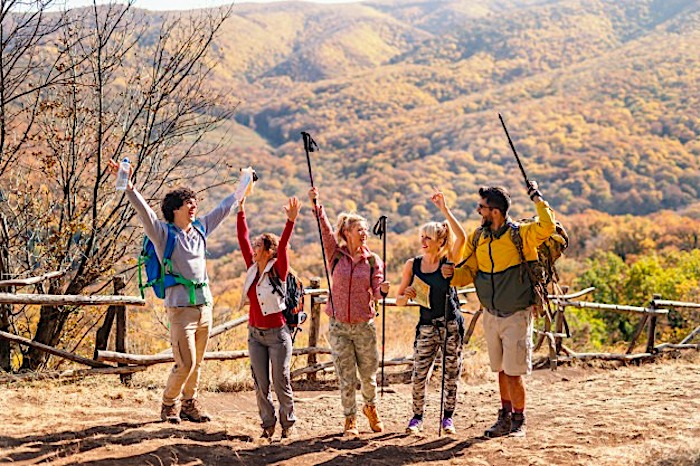
There are many work exchange opportunities that offer long term free RV camping sites. Some of these sites will be for dry camping, but many offer full hook-ups. Sometimes you will be required to do a certain number of work hours per week for the property owner. Other opportunities simply need you to be present as a caretaker.
If you would like a long term campsite on government land, you can be a park host. Go to Volunteer.org and search for park host opportunities. Leave everything on their search form blank. Select “RV/Trailer Pads” for your Housing & Amenities options. My most recent result returned 487 volunteer positions that have a free RV space.
Workamping provides free RV camping spots on private property. You agree to do part-time work for the property owner. Snowbird RV Trails has published a comprehensive list of free online resources. Use this list to help you find the perfect Workamping opportunity.
There are several other work exchange websites you can search for opportunities. They do not cater to RVers. Use their search filters can help you find opportunities that offer free RV camping.
Use HelpX and Workaway to Find Free RV Camping Locations
Helpx.net and Workaway.info both require low-cost annual memberships. They each have thousands of listings. About half of the listings are placed by rural property owners. They are looking for part-time general agricultural labor. These hosts have ample land available for you to park your RV.
Foundation for Intentional Community is Another Good Way to Find Free RV Camping
This free website maintains a directory of intentional communities throughout North America. Many communities are in their beginning stages and are looking for people to come live on the land. You can stay in your RV while enjoying communal gardening and building projects.
Use their Advanced Search feature to identify communities that are a good fit for you. Remember to use the search term “RV” to find communities that offer free RV camping.
Gold Prospecting Clubs Have Free RV Camping – Sometimes
Gold prospecting clubs acquire rights to many gold mine claims. They manage the properties and their members have access to all the land. Many prospecting clubs allow their members to camp at claim sites on a long term basis. Most clubs provide training events where you can learn how to pan and mine for gold. Some clubs provide onsite equipment at the claims. You get to keep all the gold that you find!
Choosing a club requires careful research. Some clubs only let members go to the claims for short periods of time. These clubs are focused on providing hobbyist education and socializing. Other clubs are all about providing unfettered property access to their members. That’s the kind of club you want to join.
When you are researching prospecting clubs you should consider four things.
- How many claims do they own?
- How much total land do they manage?
- How many long term camping spots are available?
- How much are the membership fees?
The Gold Miner’s Headquarters provides a free directory of prospecting clubs. Many of them don’t have websites, so you will have to call them on the phone. You’ll have to figure out what you are looking for and analyze each club’s offerings. With careful research and due diligence, you can secure a beautiful remote campsite.
Tips When RV Camping for Free
It is essential to keep the size of your vehicle in mind as you venture out into more remote sites. When it comes to dispersed RV camping locations, often, the smaller the RV, the better. You don’t want to get stuck and then have a long walk through rough country to get help.
Free RV camping is widely available on public lands throughout the western USA. And to some lesser extent in the eastern US, where there is much more privately owned property. Some states allow free or low-cost RV camping on public lands. As an example, Arizona offers a public lands recreation permit ($20) that allows free RV camping on state lands. While it is not entirely free, it is pretty darn close.
In cities and large towns, you will be able to find places to park for a night or two before moving on. Long term free RV camping sites are usually located off the beaten path. You will find them in rural and wilderness locations. Smaller RVs with good ground clearance are best for these types of campsites. Make sure you have a full tank of gas before you leave the last town on your route. You will also need groceries and other essentials before you leave civilization.
Boondocking requires more self-reliance than the traditional RV lifestyle. You will need a well-stocked first aid kit and basic CPR and first aid training. You should enjoy being in nature and understand basic outdoor survival skills. You can expect to encounter wild animals, insects, severe weather, and isolation. While your RV provides a radical level of comfort, when you boon-dock you are still camping.
If you are new to camping and boondocking, take some time to practice before going to your first long term site. Spend time living in your RV without hookups at a traditional campground or even in your own yard. Research dry camping and boondocking online and build your skill set. Build a social network of people who are experienced with free RV camping. Make sure you have a support network!
Learning how to find free RV camping sites is worth the effort. A slow paced low-cost lifestyle outside of the rat race is what most of us are looking for. Let me show you how it’s done!
Best Places for Free Overnight RV Parking
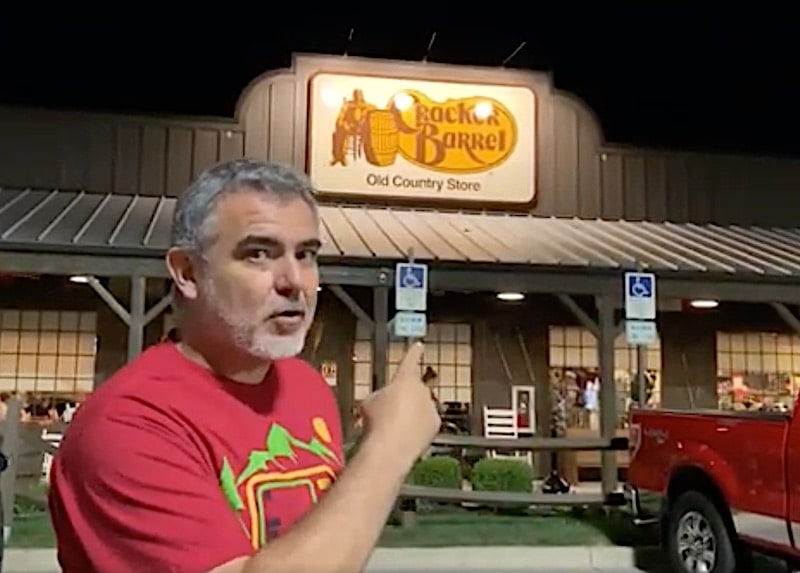
There are other places you can consider when you need a free overnight RV camping or parking spot. It is highly recommended that you ask for permission before using an open spot for parking your RV for the night. If you don’t ask permission and “sneak” into a place, you may find yourself dealing with a trespassing ticket before you move on. Also, the smaller your RV, the better your chances are of finding places to stay.
Be smart! Be Safe! Always ask for permission.
- Truck Stops: Be considerate of the big rigs!
- Walmart: Read our article Overnight RV Parking At Walmart – Know Before You Go for a full understanding of Parking overnight at Walmart.
- Nightclubs: If you had one too many.
- Fraternal Organizations: VFW, Elks, etc. often allow free RV camping for members.
- Parks: Community, City, County, and State parks sometimes offer free RV camping.
- Churches: Call ahead for permission.
- RV Dealers: Some dealers allow overnight stays.
- Cracker Barrel Restaurants: Typically allow overnight RV parking. Check out our article called Can RVs Park Overnight at Cracker Barrel? for full info.
- Highway Rest Areas: All rest areas allow a few hours of free RV parking.
- Big Box Retailers: Kmart, Best Buy, Sams Club, and Costco will often allow overnight RV parking.
- Roadside Parks & Picnic Areas
There are a lot of free RV camping and parking possibilities. Often the key is to ask first. Always play it safe. It is a good idea to consider your surroundings carefully. If you feel uncomfortable with the area, it may be a good idea to move somewhere else. Better safe than sorry! You can also use our favorite App called OvernightRVParking to find great FREE places to park your RV for a night.
Finding Free Overnight RV Parking
Going on road trips is what RVing is all about. When you’re on the move all you need is a place to stop for the night. Whether you are in a big city or a small town, there are almost always options for free overnight RV parking.
Most free overnight RV parking sites are going to have issues with light and noise pollution. Pull down your blackout shades, take a dose of melatonin, and put on some chill background music. You will get you the solid night of sleep you are craving.
Staying Overnight at Truck Stops
Truck stops and travel centers are a favorite option for many campers. The Flying J, Love’s, and Pilot are three major truck stop chains that provide free overnight RV parking. Most other truck stop franchises also provide free overnight RV parking. it is always wise to check with the manager on duty to confirm that there are no fees.
Truck stops usually have showers, laundry centers and restaurants available. You can refill your water tank at many truck stops and some of them have dump stations. They also have a good selection of merchandise geared towards people living on the road. Truckers going your direction can be priceless sources of information. Talk to them when you are researching the next leg of your trip.
Most truck stops have a separate lot for RVs, but when it is full the employees will often tell you to park in the truck lot. Look around and consider how full the truck lot is. You are smaller than the trucks. There is a chance that you could be hit by a driver who was not looking out for an RV sized vehicle. If the lot is almost full you should drive a bit further and look for another overnight parking location.
Be considerate of the other people at the truck stop. Don’t hold up gas and water filling stations. Don’t extend your slides. Remember that everyone there is as road-weary as you are. Be a good member of the traveling community.
Catch A Nap At An Interstate Rest Stop
Sometimes you get stuck on a long stretch of road where there isn’t a town or city. In these situations, interstate rest stops are the way to go. Just like truck stops, there are usually designated parking areas for large vehicles.
Many rest stops have nice public restrooms and good lighting. Some have on-site security and public areas for picnics and outdoor recreation. Other rest stops are nothing more than dark deserted parking lots on the side of the highway.
When you’re nodding off at the wheel on a long stretch of road, you’ll be happy to see the rest stop sign. Be prepared for a short stay if the place turns out to be sketchy.
Pay attention to your surroundings and safety. Don’t get out of your RV after dark. Don’t get out during the day if the rest stop appears to be deserted and un-patrolled. Lock your doors, get some sleep, and move on when you are refreshed.
Some rest stops are patrolled by the police to reduce crime. This means that you may be approached by the authorities. You may be asked about your identity and activities, even if you have done nothing wrong. Make sure your paperwork is in order and within reach.
Some states do not allow overnight parking at rest stops. Do a quick Google search for the state’s rest stop policies when you pull in. If they have a limit on how long you can park then make sure to set an alarm and move on in time.
Big Box Stores Love Campers
While you can only find truck stops and rest stops on the interstate, almost every town in America has a Wal-Mart. Several big-box retailers let 18-wheelers and RVs park in their lots overnight. Wal-Mart, Cracker Barrel, Cabelas, Lowe’s, and Home Depot are all known for hosting campers.
Many cities are cracking down on overnight parking. This is a side effect of their war on the homeless population. Some stores have also banned the practice after bad experiences with inconsiderate campers. Never assume that it is okay to park. Always get permission from a store manager.
Sometimes stores have a dedicated parking area for large vehicles. If you can’t find one, the best strategy is to park at the far edges of the lot. Make sure that you are not blocking traffic or taking up prime spots that should be used by the store’s customers.
When parking in big box lots, don’t break out your outdoor living room. This is not the proper environment for throwing some hot dogs on the grill. Be a considerate low footprint camper.
Rural Solutions For Free Overnight RV Parking
What happens when you find yourself way out in the sticks and looking for a place to park? The best option is a call to the local sheriff’s office. Explain that you are traveling through the town and need a spot to park your vehicle overnight. Most small town police departments will be happy to help.
You may be given permission to park in a government-owned spot. They might put you in touch with local churches or businesses. You might even make some friends and share a meal.
Some small towns and rural areas have a history of hostility towards outsiders. Some areas have corrupt police forces that like to extort travelers for revenue. The best way to avoid these situations is to call before you arrive! If the sheriff’s department is not welcoming and helpful, heed the red flag and keep on trucking.
Conclusion
As you can see, there are many opportunities for free, or at least, extremely low-cost, RV camping here in the United States. These free options can offer RVers watching their budget a great way to save money on their open-road vacation adventures and still have a fantastic experience. They can also provide the more adventurous RVer with opportunities to experience a quieter, more primitive RV camping experience.
And, while it can take time to learn the ins-and-outs of locating free RV camping sites, or locating those remote “dispersed” campsites, there are many tools available to help you get started. Once you have learned to make the most of this kind of RV experience, you may find it becomes your preferred method for exploring the country.
Do you have any great free places to camp in your RV that you would like to share? Please leave your comments below and help a fellow RVer!

